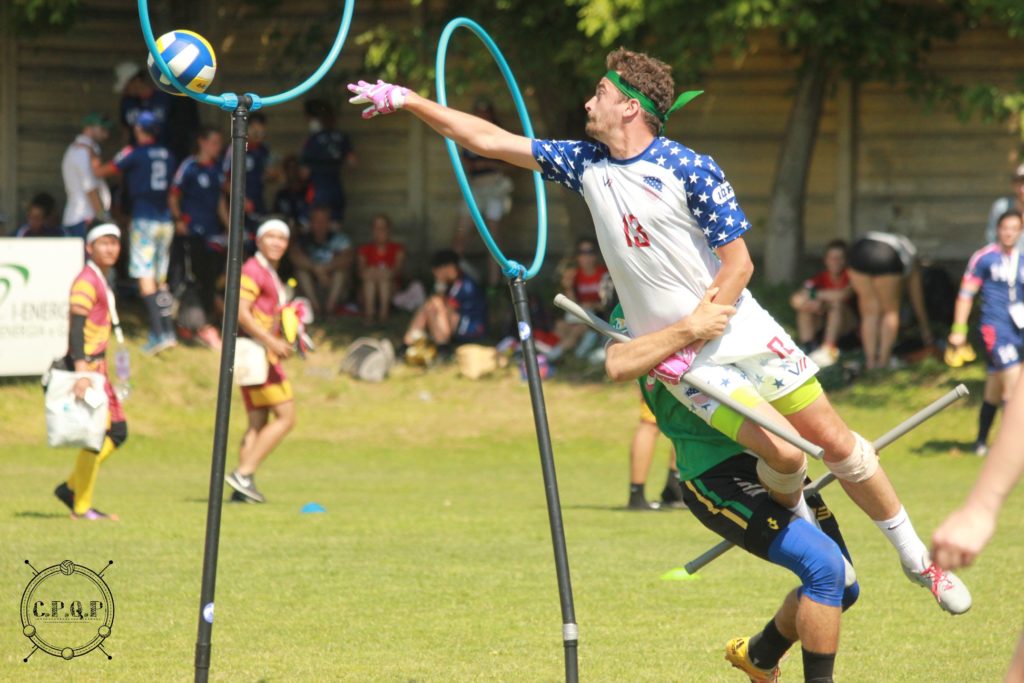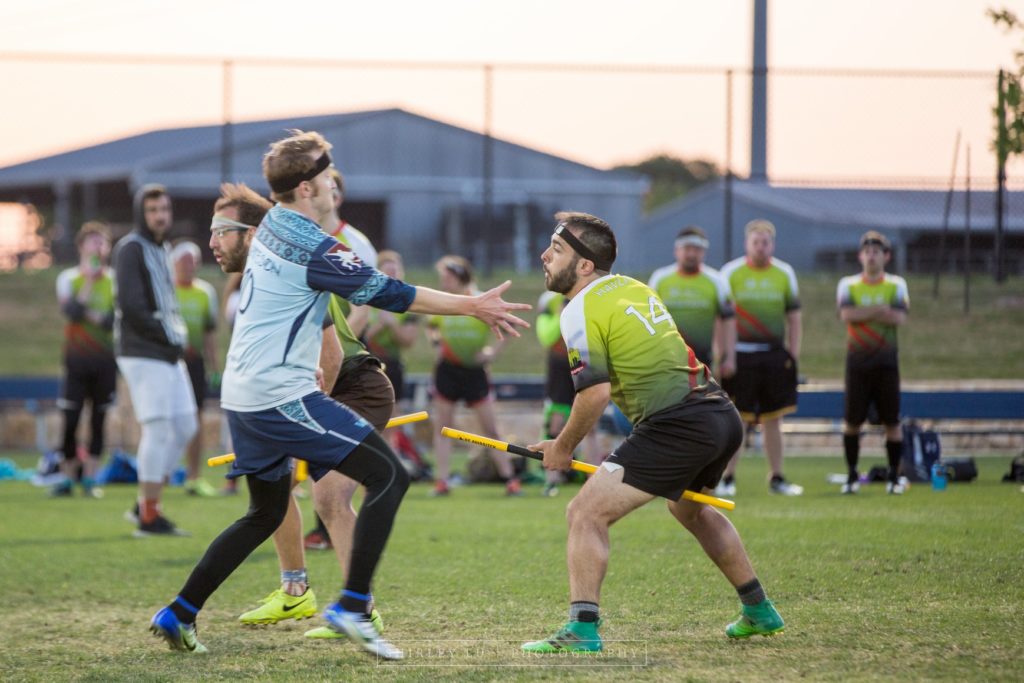Antwerp QC, Much of Belgian Core, Leaves Competitive Quidditch

Credit: Claire Purslow
In addition to our preseason rankings, The Eighth Man staff will be releasing a series of articles focusing on the top 10 club teams and top 10 collegiate teams. Each article will be written by two members of the staff, one who believes the team will live up to or exceed expectations and one who thinks they will come up short.

Never Out of the Game
By Raghuveer Achukola, Correspondent
We all know the story. After splitting in two, the once dominant Q.C. Boston is now stretched too thin. After a dominant season when the team won USQ Cup 9, Boston has posted two consecutive disappointing quarterfinal exits at nationals. And after last year’s performance, which included an ugly loss to the Long Beach Funky Quaffles, many are content to write off Boston as an aging team that is slowly fading away from its past glory.
The problem is that this narrative places far too much weight on one performance. It is true that Boston lost an incredible three times at this last nationals–but looking at the score lines of each game suggests a different story. All three losses were in snitch-range. They also came when Boston was either ahead or even in quaffle points. In each match, Boston held a 30-point lead over their opponent at some point in the game. With a little more depth, Boston stands a great chance of maintaining these 30-point leads and taking the game out of range.
Historically famed for boasting the combination of USNT seeker Harry Greenhouse and USNT beater Max Havlin, Boston’s apparent snitch-on-pitch failures seem especially jarring. But when considering the fact that Greg Bento was at seeker so Greenhouse could run up the score in the quaffle game, , the results are more understandable. But Boston boasts two players with experience seeking on the international World Cup stage:– Greenhouse and USNT keeper Jayke Archibald.Perhaps a simple temporary rotation of these players in the yellow headband might have been all that was needed for Boston to win those in-range games.
Yes, Q.C. Boston needs to learn how to take games out of range and, yes, the front line of USNT players is called on too often. Boston may not even make it to the finals of nationals this season. While Q.C. Boston’s SWIM record this year (7-4) is worse than their records the last two years (5-1, 4-1), it is still not bad. Even if they are stretched just as thin at this season’s nationals, one simple fact will ensure that this team goes deep into bracket play: Unlike every club team last year save Texas Cavalry or the Nomads (NW), Q.C. Boston didn’t lose a single game last season out of range. In fact, the last out-of-range loss that Q.C. Boston suffered was in pool play of IQA World Cup VII–over four years ago. That’s the longest such streak in recorded USQ history. A performance history like this does not happen by chance. The Boston offense is extremely skilled at controlling the pace of the game, a testament to how in-sync the main player line is. Consisting of Archibald, Havlin, Lulu Xu, Greenhouse and Grace Dastous, this line has played together for multiple seasons, including this summer as members of the Boston Night Riders.
The criticisms of this team are insubstantial. Boston played 11 in-range games last season? So did club champion Texas Cavalry. Q.C. Boston had a lackluster SWIM record (7-4)? So did Texas Cavalry (8-3). Q.C. Boston has played just as many in-range games as the Bosnyan Bearsharks and had a better SWIM record against both the Bearsharks and The Warriors–teams ranked above them in our rankings. Teams like the Bearsharks and The Warriors have to worry about getting blown out. Q.C. Boston’s route to success, on the other hand is two steps.
1) Limit the number of in-range games
2) Win the few in-range games you play
Step one can be accomplished by simply training their second line to play just a few more minutes in games. Kieran Collier and Emily Heislein’s return after beating together for the Boston Night Riders can only take pressure off of Q.C. Boston’s front line. As for step two, with the extra help in the beater game, Boston should be able to give their seekers the chance to make the grab. Yes, they wound up on the wrong side of the snitch grab last year but with Boston’s snitch-on-pitch unit, you would be hard pressed to say they aren’t favored in every in-range game they play… which, if you go by history, is every game. A No. 5 ranking is drastically underestimating this team. Expect Q.C. Boston to prove in April why they are a perennial threat.

Credit: Shirley Lu

A Quiet Riot or Meak Massacre
By Eric Wasser, Correspondent
It is hard to say that a program featuring four members of the USNT is in decline, but that has been the case ever since USQ Cup 9, when Q.C. Boston celebrated what was the most dominant season of quidditch ever. The next year, Boston fell to their own splinter cell–the Bosnyan Bearsharks–in the national quarterfinals but most attributed that upset to the Bearsharks’s former Boston players leveling the skill gap. The community still expected Boston to regain their dominance in the following season. Unfortunately, at USQ Cup 11, Boston proved susceptible to physical, high-pressure point chasers and stout hoop defenses. Their struggles started in pool play, with a loss to Texas Cavalry, quickly followed by a crushing upset against the Long Beach Funky Quaffles. Entering their final game of pool play against Lake Erie Elite, Boston needed to win in order to continue onto bracket play. Trailing by 40 at the 18-minute mark, Boston beater Max Havlin created back-to-back turnovers to help his team fire off two goals in quick succession. A snitch catch secured them the win, 130*-120. This game continued to show their susceptibility to strong tackling, particularly in zone coverage. In the Sweet 16 rematch, Lake Erie held off the Boston seeking corps to clinch the 100*-70 victory, eliminating the once champions.
Boston seems to live by the motto “a good offense is the best defense.” But they haven’t been out of range in a loss since University of Texas beat them at World Cup VII. However, they continually allow teams to put up points and stay in range. In order to avoid future upsets–and sneak past top programs with better seeking games–Boston has to reclaim the ability to make hard hits on defense and push through tackles in order to secure games without the coin-flip of snitch play.
Unless Jayke Archibald can drag Boston’s virtually unchanged quaffle game kicking and screaming to the championship, much like he did in the second USNT match against Team Australia, Boston must find some more physicality in order to comfortably meet expectations. However, considering the substantial lack of roster additions in the offseason, that seems unlikely.
Archives by Month:
- May 2023
- April 2023
- April 2022
- January 2021
- October 2020
- September 2020
- July 2020
- May 2020
- April 2020
- March 2020
- February 2020
- January 2020
- December 2019
- November 2019
- October 2019
- August 2019
- April 2019
- March 2019
- February 2019
- January 2019
- November 2018
- October 2018
- September 2018
- August 2018
- July 2018
- June 2018
- April 2018
- March 2018
- February 2018
- January 2018
- November 2017
- October 2017
- July 2017
- June 2017
- May 2017
- April 2017
- March 2017
- February 2017
- January 2017
- December 2016
- November 2016
- October 2016
- September 2016
- August 2016
- July 2016
- June 2016
- May 2016
- April 2016
- March 2016
- February 2016
- January 2016
- December 2015
- November 2015
- October 2015
- September 2015
- August 2015
- July 2015
- June 2015
- May 2015
- April 2015
- March 2015
- February 2015
- January 2015
- December 2014
- November 2014
- October 2014
- September 2014
- August 2014
- July 2014
- May 2014
- April 2014
- March 2014
- February 2014
- January 2014
- November 2013
- October 2013
- September 2013
- August 2013
- July 2013
- June 2013
- May 2013
- April 2013
- March 2013
- February 2013
- January 2013
- December 2012
- November 2012
- October 2012
Archives by Subject:
- Categories
- Awards
- College/Community Split
- Column
- Community Teams
- Countdown to Columbia
- DIY
- Drills
- Elo Rankings
- Fantasy Fantasy Tournaments
- Game & Tournament Reports
- General
- History Of
- International
- IQA World Cup
- Major League Quidditch
- March Madness
- Matches of the Decade
- Monday Water Cooler
- News
- Positional Strategy
- Press Release
- Profiles
- Quidditch Australia
- Rankings Wrap-Up
- Referees
- Rock Hill Roll Call
- Rules and Policy
- Statistic
- Strategy
- Team Management
- Team USA
- The Pitch
- The Quidditch Lens
- Top 10 College
- Top 10 Community
- Top 20
- Uncategorized
- US Quarantine Cup
- US Quidditch Cup
